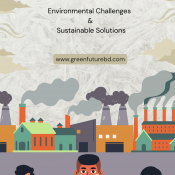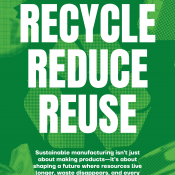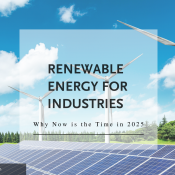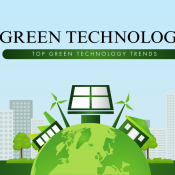Renewable Energy for Industries: Why Now is the Time in 2025
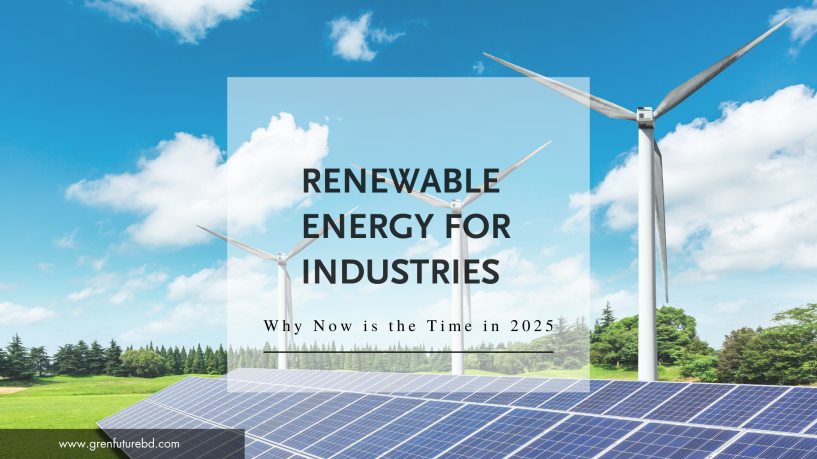
The global energy landscape is changing faster than ever before. As we step into 2025, industries across the world are under increasing pressure to reduce carbon emissions, cut operational costs, and meet stricter environmental regulations. At the same time, renewable energy technologies have become more affordable, efficient, and widely available.
This convergence of economic, environmental, and technological factors makes 2025 the perfect moment for industries to accelerate their shift toward renewable energy. In this article, we’ll explore why now is the time for industries to embrace renewable energy, what solutions are available, and how businesses can gain both financial and reputational advantages from this transition.
If your company is exploring renewable energy adoption and needs expert consultancy, you can visit greenfuturebd.com—a trusted eco-consultancy firm in Bangladesh helping industries adopt green solutions for long-term sustainability.
Why Renewable Energy is Crucial for Industries in 2025
The industrial sector is the backbone of economic growth but also one of the largest contributors to global greenhouse gas emissions. Energy-intensive industries such as textiles, cement, steel, food processing, and chemicals depend heavily on fossil fuels, which:
- Drive up carbon emissions
- Increase air and water pollution
- Expose industries to volatile fuel prices
- Risk regulatory non-compliance
On the other hand, renewable energy—solar, wind, biomass, hydropower, and green hydrogen—offers clean, stable, and cost-effective alternatives. By 2025, the cost of renewable technologies has fallen dramatically, making them competitive with (and in many cases, cheaper than) fossil fuels.
Global and Local Drivers of Renewable Energy Adoption
1. Falling Costs of Renewable Technologies
According to international energy reports, the cost of solar photovoltaic (PV) modules has dropped by more than 80% in the last decade. Wind energy, too, is now one of the cheapest sources of new power generation. This means industries can now install renewable systems with shorter payback periods and higher long-term savings.
2. Government Regulations and ESG Requirements
Governments worldwide, including Bangladesh, are introducing stricter environmental laws and promoting green financing schemes. At the same time, global buyers in sectors like textiles demand ESG (Environmental, Social, Governance) compliance from their suppliers. Industries not shifting to renewable energy risk losing business opportunities.
3. Energy Security and Independence
With fossil fuel prices fluctuating due to geopolitical tensions, renewable energy provides industries with stable and predictable energy costs. On-site generation—like rooftop solar—helps reduce reliance on grid electricity and imported fuels.
4. Corporate Reputation and Branding
Consumers and international buyers prefer companies that demonstrate sustainable practices. Using renewable energy strengthens brand image and builds trust with stakeholders.
To explore how your business in Bangladesh can transition smoothly, contact greenfuturebd.com for tailored renewable energy consultancy services.
Types of Renewable Energy Solutions for Industries
1. Solar Energy
- Rooftop Solar PV Systems: Ideal for factories, warehouses, and commercial buildings.
- Solar Farms: Large-scale installations connected directly to the grid or captive use.
- Solar Water Heating: Reduces reliance on electricity or gas for industrial heating.
Why now? Solar is one of the most mature, affordable, and easy-to-deploy renewable solutions in 2025.
2. Wind Energy
- Onshore Wind Farms: Large turbines installed in open areas or industrial zones.
- Hybrid Solar-Wind Systems: Combining both for round-the-clock renewable supply.
Industries located near coastal or windy regions benefit most from wind energy projects.
3. Biomass and Biogas
- Biomass boilers: Convert agricultural and organic waste into energy.
- Biogas digesters: Generate renewable fuel for heat and electricity.
This is particularly relevant for agro-based industries in Bangladesh that produce significant organic by-products.
4. Hydropower and Micro-Hydro
While large dams are less feasible for private industries, micro-hydro projects can be installed in areas with small rivers or water channels. These are especially useful for rural industries.
5. Green Hydrogen
Green hydrogen is gaining global momentum in 2025 as a clean alternative to fossil fuels in heavy industries. It is produced using renewable energy-powered electrolysis and can be used in:
- Steel and cement production
- Chemical manufacturing
- Industrial heating
Although still emerging, green hydrogen holds massive potential for industries aiming for deep decarbonization.
Benefits of Renewable Energy for Industries
1. Cost Savings
Renewable energy reduces dependency on expensive fossil fuels and grid electricity. Over time, industries save millions through lower utility bills and stable energy costs.
2. Environmental Compliance
With stricter environmental regulations in 2025, adopting renewable energy helps industries avoid fines, penalties, and legal issues.
3. International Market Access
Global buyers increasingly demand sustainable production. Industries using renewables gain a competitive advantage in exports.
4. Energy Reliability
On-site renewable generation reduces risks of power outages and ensures smooth operations.
5. Reputation and CSR
Consumers and stakeholders favor eco-friendly businesses, giving companies a reputational edge.
Renewable Energy in Bangladesh’s Industrial Sector
Bangladesh, known for its rapidly growing textile and garment industry, faces major challenges in balancing industrial growth with environmental sustainability. With frequent power shortages, rising fuel costs, and international pressure for compliance, renewable energy adoption is no longer optional.
Forward-thinking industries are already:
- Installing rooftop solar systems on factories.
- Using biogas plants to power boilers.
- Partnering with consultants like greenfuturebd.com to design energy-efficient strategies.
The government is also offering green financing options through banks to support industrial renewable projects.
Challenges in Industrial Renewable Energy Adoption
Despite the clear benefits, industries still face some challenges:
- High upfront investment (though costs are falling and financing is available).
- Lack of technical expertise in renewable energy integration.
- Grid infrastructure limitations in certain areas.
- Uncertainty about return on investment for emerging technologies like hydrogen.
This is why professional consultancy is crucial. Experts at greenfuturebd.com can help industries evaluate feasibility, access financing, and implement customized renewable energy solutions.
Case Study: Textile Industry and Renewable Energy in 2025
The textile and garment sector in Bangladesh employs millions and contributes significantly to exports. However, it is also energy-intensive and highly scrutinized for sustainability practices.
- Rooftop solar projects in textile factories are already saving up to 30% in energy costs.
- International buyers such as H&M, Nike, and Zara increasingly require renewable-powered supply chains.
- Factories integrating renewable energy are not only reducing carbon emissions but also gaining priority orders from global brands.
This example proves that renewable energy adoption is directly tied to profitability and market survival in 2025.
Steps for Industries to Transition to Renewable Energy
- Conduct an Energy Audit – Understand current consumption and inefficiencies.
- Identify Suitable Renewable Solutions – Solar, wind, biomass, or hybrid systems.
- Evaluate ROI and Financing Options – Use green financing and government incentives.
- Start with Pilot Projects – Small-scale solar or biogas systems can build confidence.
- Scale Up – Gradually expand renewable integration across operations.
- Monitor and Optimize – Use IoT and AI to track performance and savings.
Professional support from greenfuturebd.com ensures industries follow a structured, cost-effective approach.
Why 2025 is the Perfect Time
The convergence of these factors makes 2025 the ideal year for industries to switch to renewables:
- Falling technology costs
- Strong government and financial support
- Global buyer pressure for sustainability
- Immediate cost savings and competitive advantage
Delaying the transition risks higher costs, loss of market access, and environmental penalties.
The question for industries in 2025 is no longer if they should adopt renewable energy but when. The answer is clear: the time is now.
From solar and wind energy to biomass and hydrogen, renewable solutions are more accessible and beneficial than ever before. Companies that embrace these technologies will not only cut costs but also secure their place in a green, competitive global economy.
For industries in Bangladesh and beyond, the transition may seem complex, but expert guidance is available. Visit greenfuturebd.com today to learn how your industry can take the first step toward a sustainable, renewable-powered future.
Published on: Monday, 8 September 2025, 02:54 pm ▪ Last update: Monday, 8 September 2025, 04:20 pm ▪ Total View of this Page: 523



